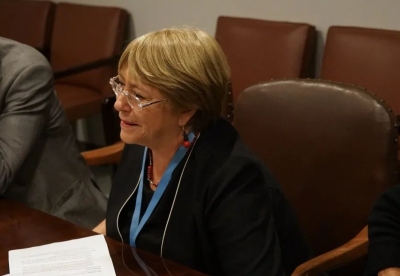CAA lacks objectivity, not in sync with intl covenants: UNHRC to SC
By IANS | Published: March 3, 2020 03:23 PM2020-03-03T15:23:41+5:302020-03-03T15:56:07+5:30
The UN Human Rights Council has moved an intervention application in the Supreme Court criticizing the Citizenship Amendment Act, as it puts Muslim migrants at risk and also has issues of reasonableness and objectivity, which may not be in sync with India's commitment to international covenants.

CAA lacks objectivity, not in sync with intl covenants: UNHRC to SC
New Delhi, March 3 The UN Human Rights Council has moved an intervention application in the Supreme Court criticizing the Citizenship Amendment Act, as it puts Muslim migrants at risk and also has issues of reasonableness and objectivity, which may not be in sync with India's commitment to international covenants.
The application was filed by Michelle Bachelet Jeria, the UN High Commissioner for Human Rights (the High Commissioner).
The High Commissioner has sought to intervene as amicus curiae (third-party) in the case, citing her mandate to protect and promote all human rights and to conduct necessary advocacy established pursuant to the UN General Assembly resolution.
"While reducing the risk of refoulement for certain communities, the CAA unequally places other communities at such risk. Accordingly, the narrow scope of the CAA, which extends protection from return only on religious grounds and limited to the specific ethno-religious groups, may not be sufficiently objective and reasonable in light of the broad prohibition of refoulement under international human rights law," said the High Commissioner in the application.
The application said that for the purpose of this intervention application, in the present case, the question is therefore not a matter of the general purpose of the law, but whether the differentiations drawn within the law (CAA), namely the exclusion of persons from the scope of the law, on the basis of their religion is sufficiently objective and reasonable.
The application says the CAA protects Afghan, Bangladeshi and Pakistani Buddhist, Christian, Hindu, Jain, Parsi and Sikh migrants who meet the conditions set out in the CAA from being returned to a country where they would face persecution on religious grounds, by addressing their irregular migration status by providing them with an expedited pathway to citizenship.
"While this is a worthy and commendable objective, it raises a number of issues related to India's wider human rights obligations in the context of the fundamental principle of non-refoulement," added the plea.
( With inputs from IANS )
Open in app